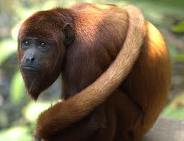Beatrice & Virgil.
Toronto: Random House, 2010.
ISBN 9780307398772.
Last weekend my friend AG visited and when our conversation turned to books she said she was reading Beatrice and Virgil. She said that she was enjoying it. I remembered that it was somewhat controversial when it was published, as it had something to do with The Holocaust.
When I did not find it at my local used book store, I took advantage of an unexpected stop near my library to borrow the book. When I began reading it Saturday, I was bemused that a howler monkey
 |
| Howler Monkey |
 |
| Pascale Brussières |
As it turned out, there are several 'nature' shots of
 |
| Spider Monkey |
So I was surprised when I read in B&V, following a long listing of the contents of a taxidermist's store:
Next to the table stood a glass cabinet with an array of insects and colourful butterflies arranged in different display boxes, some featuring a single, spectacular speciment — a large blue butterfly or a beetle that looked like a small rhinoceros — others filled with a number of species playing on variety (60).This surprised me because not only was the Blue Butterfly (Blue Morpho) central to the story, obviously, but at one point Hurt's character picks up a giant Rhinoceros beetle.
And, today, the final straw. Martel writes about his character's own fushigis.
The taxidermist nodded and continued [to read from his play]:And this amuses me, because this kind of observation and writing is something I do. I have rarely seen it alluded to in fiction let alone in this manner, which mimics mine almost exactly. Does that constitute a fushigi? Hmmmm. Probably not, but it is amusing.Virgil: Pity there's no coffee.Henry was struck by the irony of the timing. Just as coffee and cake were being delivered to them, Virgil and Beatrice mourn their absences. And earlier Beatrice had said how the sun had gone, leaving them both without faith, and here they were basking in sun. It also struck him how naked and alive Virgil and Beatrice were, so much more revealing of themselves than their author (125).
Beatrice: Pity there's no cake.
...
And Martel is being very clever here, because he continues to use that kind of irony as a mirror:
As soon as the question had left Henry's lips, the irony of it leapt to his mind. It was the same question the historian had asked him during that terrible lunch in London nearly three years ago, the question that had gutted and silenced him. And here he was aksing it himself (134).And this is, I think, a fundamental structure of the book as it relates to writing about the Holocaust. I expect that will reveal itself later in the book.
But there are parts of this book that are beautifully written.I will be citing some of them on my 'finished' post. I expect to finish the book in the next day or two.
Oh! I forgot to include a picture of Beatrice. So, here it is — with Bridget Hall. I tried to find one with Virgil sitting on her back, but this was kind of the closest I could find to a monkey sitting on a donkey.











You are more than welcome. Thank you for commenting.
ReplyDelete